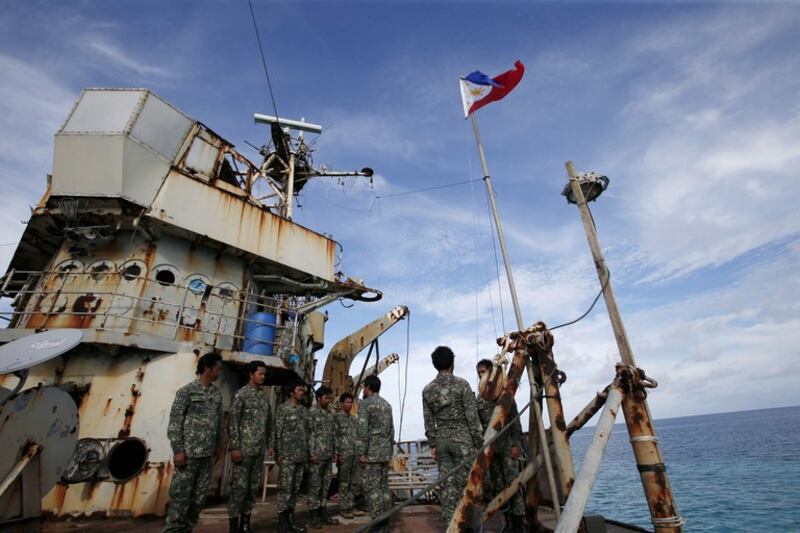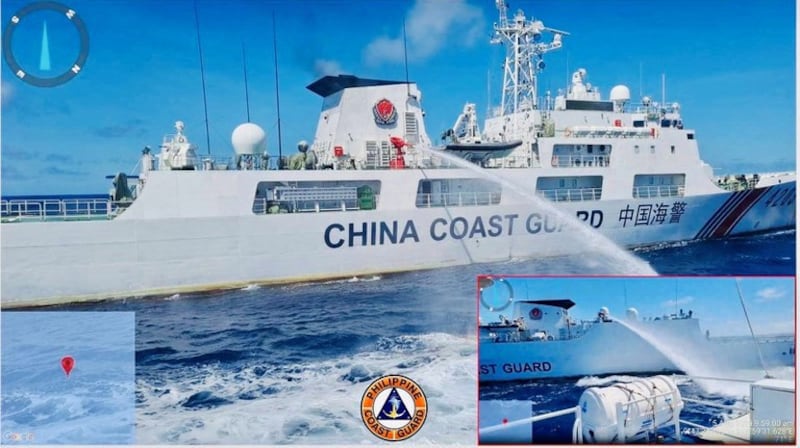The Philippines and the United States are set to launch joint patrols in the South China Sea this year amid heightened tensions in the region stoked by China’s increasing aggressiveness, a senior official in Manila said Wednesday.
Joint patrols have been on the table since President Ferdinand Marcos Jr. assumed power last year, reversing his predecessor Rodrigo Duterte's pivot to Beijing, during which China became more emboldened in pressing its territorial claims.
China asserts sovereignty over most of the South China Sea and has for years militarized artificial islands while deploying coast guard boats, navy ships and a state-backed maritime militia around disputed areas.
“The discussions on joint patrols are in their advanced stages,” Jonathan Malaya, a spokesman for a Philippine task force on the South China Sea, told BenarNews. “That’s going to be within this year.”
He declined to give further details, citing the sensitivity of the matter. There was no immediate response from the U.S. embassy to a request to comment.
Tensions have soared between the two neighbors after the Chinese Coast Guard backed by its maritime militia on Saturday used a water cannon to drive away a Filipino boat carrying supplies to troops stationed on the BRP Sierra Madre, near Ayungin Shoal (Second Thomas Shoal).
The rusty World War II-era naval ship was deliberately run aground by Manila in 1999 to serve as a military outpost in the South China Sea.

Beijing has in recent days reiterated calls for Manila to tow away the boat and live up to its “promises” to remove it.
Malaya, who spoke earlier at a forum held by the Foreign Correspondents Association of the Philippines, denied such a pledge had ever been made.
“I can categorically say to the public and to everyone that no administration promised to remove BRP Sierra Madre, which symbolizes our sovereign rights and jurisdiction over Ayungin Shoal,” he said during the event.
“If China is talking about a legally enforceable agreement … then we challenge them: produce that written document.”
On Monday in response to a question about a U.S. State Department statement, a Chinese foreign ministry spokesperson challenged Washington’s support of Manila.
“The State Department’s statement, in disregard of the facts, attacked China’s legitimate and lawful actions at sea aimed at safeguarding its rights and enforcing the law. The statement also voiced support for the Philippines’ unlawful, provocative behavior,” the spokesperson said.
“For some time, the U.S. has been inciting and supporting the Philippines attempts to overhaul and reinforce its military vessel that was deliberately grounded on Ren’ai Jiao,” the spokesman said, using the Chinese name for the shoal. “The U.S. has been brazenly bolstering the Philippines as it infringes upon China’s sovereignty, but those moves will not succeed.”
The spokesperson also called on the U.S. to “respect China’s territorial sovereignty, maritime rights and interests in the South China Sea.”
Blockade ‘outrageous’
Saturday’s incident, which lasted more than an hour, was the latest in a growing number of perceived aggressive actions by China in the South China Sea, an important maritime trade route subject to overlapping territorial claims from China, the Philippines, Malaysia, Brunei, Vietnam and Taiwan.
China’s blockade of the Philippine resupply mission was “outrageous,” said security analyst Raymond Powell, from the Gordian Knot Center for National Security Innovation in Stanford University.
Speaking at the same forum, he said joint patrols would emphasize to China “the tightness of Philippine-U.S. alliance.”
“Having these PH-U.S. joint patrols increases the Philippines’ leverage when China is deciding what to do,” Powell said.
Manila had this week stepped up the message it would not idly stand by while its supply boats are harassed, he said.

On Tuesday, U.S. Defense Secretary Lloyd Austin III condemned the “dangerous maneuvers” by China in a telephone call with his Filipino counterpart, Gilberto Teodoro Jr., according to a readout provided by Austin’s office.
This was the second time Austin and Teodoro have spoken since the latter assumed the defense portfolio in June.
Manila on Monday summoned Beijing's envoy and issued a terse note verbale, sparking a war of words between the two countries.
The Chinese Embassy shot back that the shoal – which it calls Ren’ai Jiao – was part of its maritime domain, a position that remains “consistent and firm.”
The embassy said it had made “temporary special arrangements” to allow the Philippines to bring supplies and food to its troops on the grounded vessel.
“But for some time, the Philippine side has been taking unilateral actions once again, and seeking to overhaul and reinforce the military vessel in order to permanently occupy Ren’ai Jiao,” the embassy said in a statement on Tuesday.
China has repeatedly communicated to the Philippines through diplomatic channels it would not allow it to send construction materials to the Sierra Madre, the embassy said.
Malaya reiterated the Philippine position that the reckless blocking and water cannon operation by the Chinese Coast Guard placed Filipino lives at risk.
“We are doing the resupply mission for the benefit of the Filipino troops there and we demand from China to stop this blockade, to stop this coercive, offensive and unlawful blockade of Philippine resupply missions to Ayungin,” he said.
BenarNews is an RFA-affiliated online news organization.
